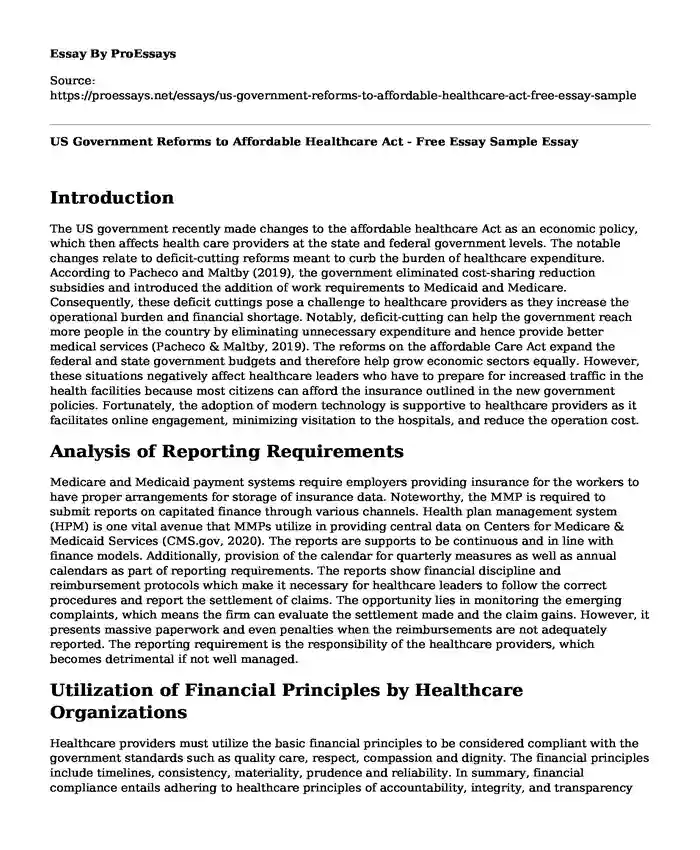Introduction
The US government recently made changes to the affordable healthcare Act as an economic policy, which then affects health care providers at the state and federal government levels. The notable changes relate to deficit-cutting reforms meant to curb the burden of healthcare expenditure. According to Pacheco and Maltby (2019), the government eliminated cost-sharing reduction subsidies and introduced the addition of work requirements to Medicaid and Medicare. Consequently, these deficit cuttings pose a challenge to healthcare providers as they increase the operational burden and financial shortage. Notably, deficit-cutting can help the government reach more people in the country by eliminating unnecessary expenditure and hence provide better medical services (Pacheco & Maltby, 2019). The reforms on the affordable Care Act expand the federal and state government budgets and therefore help grow economic sectors equally. However, these situations negatively affect healthcare leaders who have to prepare for increased traffic in the health facilities because most citizens can afford the insurance outlined in the new government policies. Fortunately, the adoption of modern technology is supportive to healthcare providers as it facilitates online engagement, minimizing visitation to the hospitals, and reduce the operation cost.
Analysis of Reporting Requirements
Medicare and Medicaid payment systems require employers providing insurance for the workers to have proper arrangements for storage of insurance data. Noteworthy, the MMP is required to submit reports on capitated finance through various channels. Health plan management system (HPM) is one vital avenue that MMPs utilize in providing central data on Centers for Medicare & Medicaid Services (CMS.gov, 2020). The reports are supports to be continuous and in line with finance models. Additionally, provision of the calendar for quarterly measures as well as annual calendars as part of reporting requirements. The reports show financial discipline and reimbursement protocols which make it necessary for healthcare leaders to follow the correct procedures and report the settlement of claims. The opportunity lies in monitoring the emerging complaints, which means the firm can evaluate the settlement made and the claim gains. However, it presents massive paperwork and even penalties when the reimbursements are not adequately reported. The reporting requirement is the responsibility of the healthcare providers, which becomes detrimental if not well managed.
Utilization of Financial Principles by Healthcare Organizations
Healthcare providers must utilize the basic financial principles to be considered compliant with the government standards such as quality care, respect, compassion and dignity. The financial principles include timelines, consistency, materiality, prudence and reliability. In summary, financial compliance entails adhering to healthcare principles of accountability, integrity, and transparency (Land, 2018). Healthcare organizations must ensure accountability in operation by providing accessible and understandable information to the public. Similarly, the health workforce must be responsible and informed of financial assets and expenditure policies. Transparency is also a vital financial principle to a health organization involving the recording of information appropriately and correctly. Health organizations must also produce financial records that are timely, consistent, and with guaranteed verification. Significantly, applying these financial principles is necessary for Medicaid and Medicare as it indicates that the organizations fully comply with government standards.
Recommended Strategies for full Reimbursement on Claims
Medicaid and Medicare reimbursement is a complex government payment system for healthcare, and as such healthcare organizations must implement prudent measures to receive timely and full compensation on claims. Significantly, I recommend health providers to shorten the process of making medical claims for timely reimbursement. However, medical claims can be tedious and even unsuccessful if not well planned. To improve the process of dealing with medical claims, the medical facilities must ensure all the financial reporting systems are efficient and updated to align with government standards (Behrendt et al., 2017). The process starts with pre-service involving recording all necessary data concerning insurance legibility, co-pays and deductibles. Additionally, healthcare providers must ensure timely documentation of financial payments for faster auditing. Furthermore, the clinical staff can seek consent and give waivers to the clients for easy compliance and cooperation. Finally, the backend staff can present claims as early as possible, that ensures timely reimbursement response.
References
Behrendt, C. A., Heidemann, F., Rieß, H. C., Stoberock, K., & Debus, S. E. (2017). Registry and health insurance claims data in vascular research and quality improvement. Vasa, 46(1), 11-15.
Land, T. (2018). Legal and Compliance Issues in the Dynamic Context of Healthcare Today.
Pacheco, J., & Maltby, E. (2019). Trends in State-Level Opinions toward the Affordable Care Act. Journal of health politics, policy, and law, 44(5), 737-764.
Center for Medicare and Medicaid Services (CMS.gov). (2020).CY, 2020 Core Reporting Requirements (11/1/2019). https://www.cms.gov/Medicare-Medicaid-Coordination/Medicare-and-Medicaid-Coordination/Medicare-Medicaid-Coordination- Office/FinancialAlignmentInitiative/MMPInformationandGuidance/Downloads/CoreReportingReqsCY2020.pdf
Cite this page
US Government Reforms to Affordable Healthcare Act - Free Essay Sample. (2023, Oct 23). Retrieved from https://proessays.net/essays/us-government-reforms-to-affordable-healthcare-act-free-essay-sample
If you are the original author of this essay and no longer wish to have it published on the ProEssays website, please click below to request its removal:
- Research Paper on Employers-Sponsored Health Benefits
- Essay on Challenges of Building Democracy in Egypt
- Essay Example on US: A Superpower Promoting Global Democracy
- Essay Example on State's Child Welfare System: Challenges & Solutions
- Paper Example on Integrating Practices: A Case Study of Physician Success
- Essay Sample on Japan's Pacific Aggression: A History of War and Invasion
- Paper Sample on Effective Health Histories: Communication & Interview Techniques







